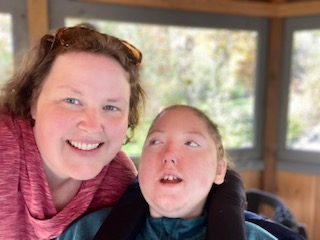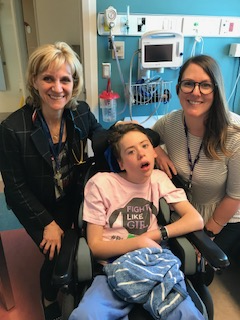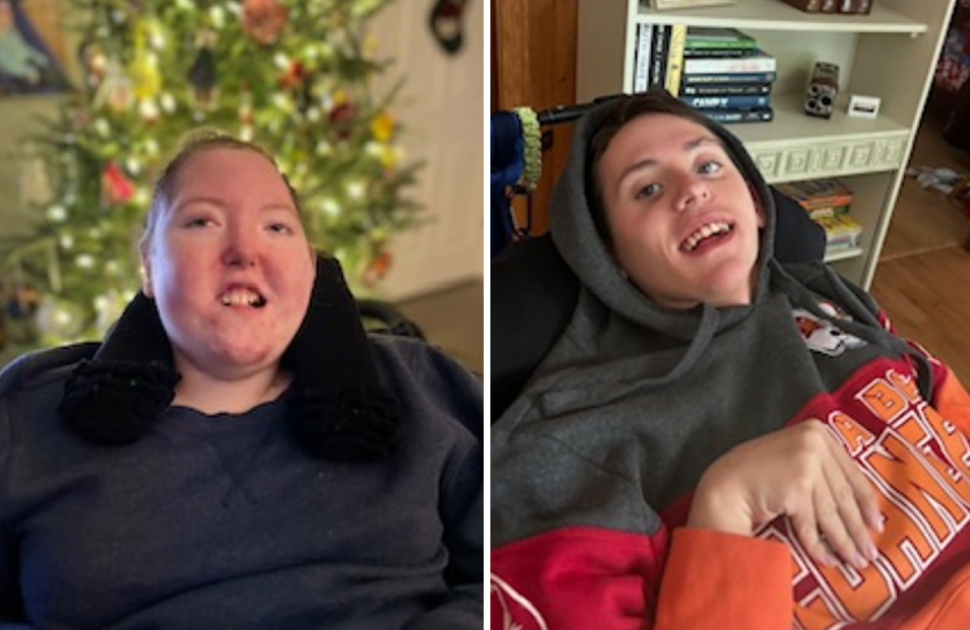
Children and youth who are medically complex, fragile, and technology dependent are the one-percenters, visiting the hospital potentially dozens of times a year, which can leave some parents and caregivers feeling overwhelmed, wading through an equally complex health-care system.
That is why CHEO's Outpatient Complex Care program serves such a valuable and impactful role, creating one cohesive team of decision-makers — including CHEO clinicians, local community organizations and families — that focuses on proactive and preventative care to help ease the medical journey and advocate for kids with the most complex health needs.
Each child admitted to the program— there were about 220 in March 2025 — also has a unique Medical Care Plan updated regularly to maintain continuity of care and an ongoing connection between health-care providers.
Meredith Muldoon Roy and Stephanie Paravan have seen the benefits of Complex Care for over a decade. Their children, Katie Muldoon Roy and Matthew Paravan, have medical conditions that include a form of epilepsy that can’t be treated by medication.
 At one point, this caused hundreds of seizures per day for each child. Their conditions have since improved, which means far fewer seizures, but they still live with a series of complex challenges.
At one point, this caused hundreds of seizures per day for each child. Their conditions have since improved, which means far fewer seizures, but they still live with a series of complex challenges.
Meredith, who now chairs the Complex Care Family Advisory Council, and has seen the program evolve to adopt a more holistic approach, which sees kids like 16-year-old Katie and 18-year-old Matthew as a whole person rather than treating individual health issues.
“Katie has been our family's whole priority since she was born, and it feels like the Complex Care team is an extension,” said Meredith.
“They know Katie almost as well as I do, and they know all of the things that she's been through, and all the things that we want for her.”
By streamlining care and addressing system challenges through empathy and fiscal responsibility, the Complex Care program transforms the patient and family experience —improving social connections and family well-being and limiting the time families spend communicating with health-care providers.
The program also helps improve the broader system by reducing Emergency Department visits, inpatient lengths of stay, visits to intensive care, and the number of surgeries for kids with the most complex health needs— examples of how proactive care can drive meaningful, system-wide improvements.
Nurse coordinator Christine Gregory, who has been with the program since it was first launched as a pilot project, says they try to take a bird’s eye view of each child’s care plan.
It's crucial in her role, she said, to establish meaningful relationships with families, whether they are part of the program until they become adults or see their condition become more manageable.
As a team, Complex Care fosters collaboration through regular family-focused meetings to support parents' or caregivers’ identified goals.
“We all have that same value and heart and are in it for the families,” said Gregory.
Matthew Paravan, who is now transitioning out of CHEO’s care, is unable to sit up in his wheelchair due to chronic pain. Still, attending Canterbury High school is vital for his emotional care because he loves being social.
 Gregory and Dr. Nathalie Major, program builder and medical director, have continued to advocate for support so Matthew can go to school every day.
Gregory and Dr. Nathalie Major, program builder and medical director, have continued to advocate for support so Matthew can go to school every day.
“Their expertise has been invaluable in Matthew's care, but just as importantly, their kindness and empathy have made a world of difference to Matthew and me,” said his mom, Stephanie.
“Their dedication goes beyond medicine — they bring comfort, understanding, and genuine care, and that means more than words can express.”
The program’s evolution over the past few years has included more virtual appointments, borne out of the COVID-19 pandemic, and it has grown to include five nurse coordinators, additional physicians, two social workers, a care facilitator, an outreach worker, a family resource worker, psychologist, dietitian, and others.
In the coming years, CHEO will introduce an innovative model of care through its new Integrated Treatment Centre to further streamline the coordination, delivery and efficiency for children with complex needs.
Katie and Matthew are Complex Care program success stories. Thanks to the program, along with other medical and surgical advances, more kids with complex health needs are now reaching adulthood.
That also means more kids are living with long-term complications, which is part of the motivation behind CHEO Foundation’s Kids These Days campaign. Over the next 10 years, CHEO will remodel, transform, and build to adapt to the growing and increasingly complex needs of children and youth.
These kids also grow up and require life-long care. Families say programs for adults with complex health needs need to catch up with the amazing progress of CHEO’s Complex Care program.
To learn more about the program, visit CHEO’s website.





